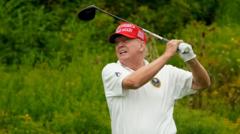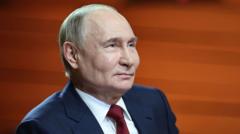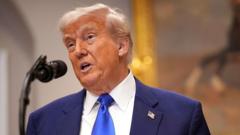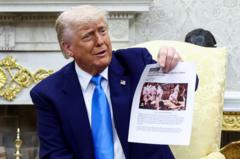Vietnam seeks to maintain strong US ties while facing potential tariffs that could affect its economy.
**Can Vietnam Navigate Trump Tariffs Through Diplomatic Fairway?**

**Can Vietnam Navigate Trump Tariffs Through Diplomatic Fairway?**
Vietnam’s PM hints at golf diplomacy with Trump amid looming tariffs.
Countries prepare for the impending tariffs as US President Donald Trump approaches his ambitious "Liberation Day in America!!!" next week. With the backdrop of new import taxes on foreign carmakers, Vietnam appears vulnerable, given its significant trade deficit with the US. The Southeast Asian nation had previously gained as companies relocated manufacturing from China to sidestep tariffs instituted during Trump’s earlier presidency.
Despite Trump’s historical criticisms of Vietnam as a trade competitor—calling it “worse than China” and "almost the single worst abuser"—he has not specifically targeted it with tariffs. Analysts note Vietnam has successfully engaged with the US, but the effectiveness of these relations in preventing tariff imposition remains uncertain.
In January, Vietnam's Prime Minister Pham Minh Chinh quipped about golfing "all day long" with Trump to benefit his nation, a light-hearted gesture drawing laughter, but highlighting his willingness to forge a personal rapport. Trade experts, however, suggest that strong personal connections may not outweigh Trump’s inclination to appear tough on trade.
Vietnam has publicly committed to maintaining trade with the US and recently announced plans for SpaceX, closely associated with Trump ally Elon Musk, to trial its Starlink service in the country. This move, along with reduced tariffs on certain US-made goods, is seen as an effort to improve trade balances and avert tariffs, especially after significant deals worth over $4 billion were inked between Vietnamese and US companies.
Careful not to appear confrontational, Vietnam’s approach reflects its “bamboo diplomacy”—adapting to external pressures while maintaining strategic flexibility. If the US escalates its stance, Vietnam might offer incentives to attract investment, particularly in hospitality, machinery, and access to rare earth minerals.
Nonetheless, China looms large. Though the US is Vietnam’s primary export market, China supplies over a third of its imports and significantly influences new investments in Vietnam. This interdependence raises concerns for Trump, prompting predictions that Vietnam may face tariffs in the future.
Many US manufacturers in Vietnam fear job losses if tariffs materialize, as businesses like Apple, Intel, and Nike have relocated production there in response to US-China trade skirmishes. Economists warn Trump’s measures could inflate domestic prices and destabilize global trade.
As Washington focuses on additional factors like "trans-shipments" of Chinese goods via Vietnam, both countries strive to balance their economic relationship. The real challenge will arrive next week when Trump’s new tariffs take effect—testing Vietnam's strategy and determining if diplomatic ties and golf diplomacy can shield it from economic backlash.




















